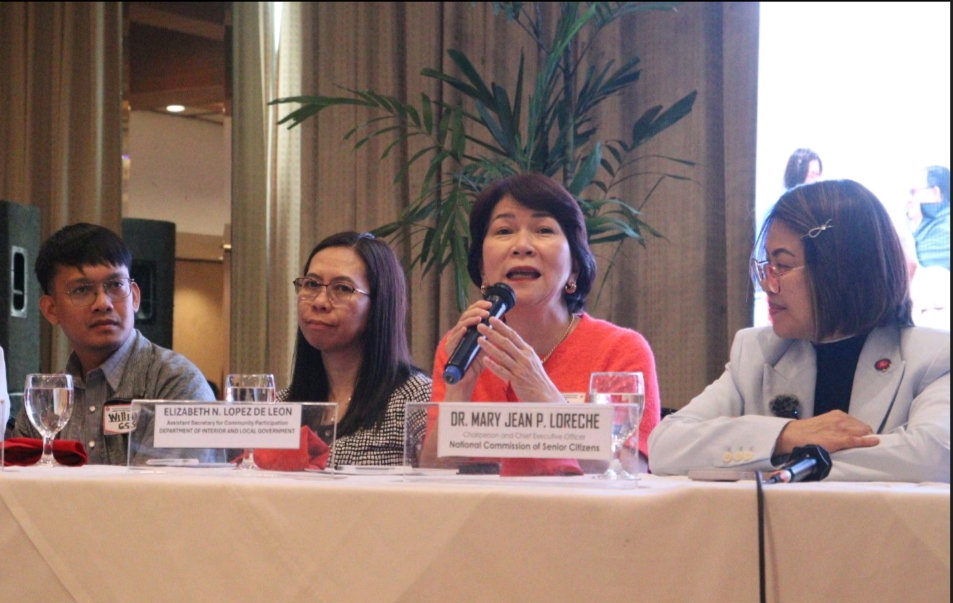By Perfecto T. Raymundo, Jr.
QUEZON CITY – The National Commission of Senior Citizens (NCSC) is strengthening the care and benefits for senior citizens with the support and cooperation of stakeholders.
The NCSC held the 6th National Advisory Board (NAB) Conference and Midterm Assessment of the Philippine Plan of Action for Senior Citizens (PPASC) 2023-2028 on Wednesday (June 25) at the Great Eastern Hotel.
The NAB Conference brought together government agencies, local leaders, and society groups, the private sector, and senior citizens organizations to track progress, align goals, and strengthen programs that support the elderly.
The national blueprint for improving senior care and support is at the heart of the event in the PPASC.
The PPASC guides efforts to promote active aging, improve access to healthcare and social services, expand protections, and create inclusive, age-friendly communities.
The NAB Conference assessed how well the PPASC has worked so far and what can be improved.
It geared towards directly benefiting older Filipinos by pushing for the following:
–Better care in communities through localized Senior Citizen Community Care Centers (SC3Cs) that offer essential services close to home;
–More benefits through updates on Republic Act No. 11982 or the Expanded Centenarians Act, which now gives recognition and cash gifts to seniors aged 80, 90, and 100 and above;
–Stronger support systems by adjusting programs based on real-life challenges faced by seniors such as access to healthcare, income security, and elder abuse.
With the midterm assessment, the NCSC reinforced its commitment to leaving no elderly Filipino behind and to ensure that the PPASC remains a responsive policy that improves lives of the senior citizens in all communities.
In a press conference, DILG (Department of the Interior and Local Government) Assistant Secretary Elizabeth N. Lopez De Leon said that with the DA (Department of Agriculture), they are implementing the “Hapag” program through the “Gulayan”, which ensures food sufficiency and even livelihood opportunity for every indigent household.
De Leon added that the DILG is receiving all kinds of complaints, especially from citizens, by dialing “911”.
The Presidential Commission on the Urban Poor (PCUP) is the government agency that helps the “informal settlers” who are less fortunate in life.
NCSC Commissioner Lt. Gen. Rainier Cruz (Ret.) assured the Filipino elderly that they can approach the NCSC, through the OSCA (Office of Senior Citizen Affairs), for their complaints, concerns and problems.
Cruz cited the instance of a complaint about a lost ticket over a radio program, which was resolved before it was aired over the radio wherein the complainant was refunded the amount of the lost ticket.
He said that they are continuously receiving complaints everyday, and if they could not do anything about it, they are referring it to the Congress of the Philippines.
Cruz added that they will coordinate with the PNP (Philippine National Police) to include the “Help Desk” exclusively for complaints and concerns of the senior citizens.
He noted that senior citizens could not possibly file their complaints during weekends (Saturday-Sunday) in the sense that OSCA offices are only open from Monday-Friday and closed on weekends.
The Philippine Retirement Authority (PRA) said that in the Philippines, there are now 81,500 foreign retirees from 150 countries which is a source or pride for us Filipinos that is why we should protect them. We continue to make ways and means to make their retirement here.”
The PRA is referring to such foreign retirees as “ageless dreamers”.
Department of Agriculture (DA) Secretary Francisco “Kiko” V. Tiu Laurel, Jr. is pushing for the “Mechanization for the Ageless Dreamers”.
The DA, through the Bureau of Animal Industry (BPI), is offering “Kambingan” program for the elderly, among others.
The Pag-IBIG has a “Housing Program for Senior Citizens” and livelihood assistance program, with 21,000 plus senior citizens availing of the program. ###







